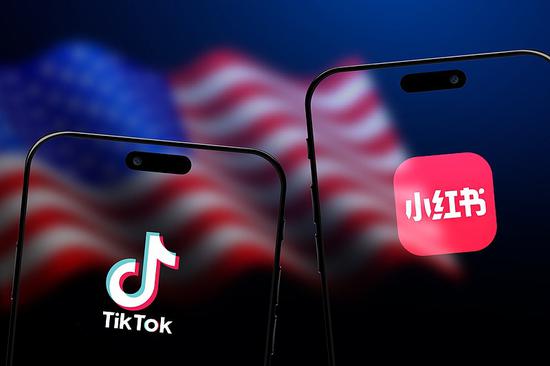'TikTok refugees' migrate to Xiaohongshu amid ban fears
Platform: Tech nationalism is self-deception, expert says
As Chinese users settle into their nightly routine on Xiaohongshu, they are overwhelmed by a flood of English-language content. Tens of thousands of self-proclaimed "TikTok refugees" from the United States have arrived at this Chinese app, which, even lacking an official English name, has been dubbed "Red Note" by U.S. users.
"Hello everyone, my name is Ryan. I'm a TikTok refugee. The American government is banning TikTok, so we're looking for an alternative. … We're very sorry to interrupt you here. Hope we don't have to stay for too long," he said in a video posted on Monday, seemingly addressing the app's Chinese users.
The video, which includes a Chinese translation read by a robot voice, received over 75,000 likes in one day.
The growing belief in the U.S. that the Supreme Court will uphold a law banning TikTok has left its 170 million U.S. users frustrated. The ban is set to take effect on Sunday, unless TikTok is sold by its parent company, ByteDance, but a sale seems unlikely, as ByteDance has firmly stated it will not sell, despite interest from potential U.S. buyers.
As U.S. users tag themselves as #tiktokrefugees, they are flocking to the Chinese app. By Tuesday, there were over 114,000 posts using the hashtag, with more than 2 million discussions and 73 million views as of 6 pm Beijing time.
Xiaohongshu had become the most downloaded app on the U.S. iOS app store on Tuesday. The second most downloaded app was Lemon8, another ByteDance-owned lifestyle platform, which is also experiencing a surge in traffic from displaced TikTok users.
The flow of "TikTok refugees" is seen as a strong social media protest against the expected ban on TikTok, with the excuse of the so-called "China threat" to U.S. information security, experts said.
Dissatisfaction reflected
Cui Di, an associate professor at Fudan University's School of Journalism, said that the "refugee" label reflects TikTok users' dissatisfaction with the current political irrationality in the U.S..
TikTok's global headquarters are in Los Angeles and Singapore, and its physical servers are owned by Oracle, a U.S. company based in Texas. But the U.S. remains prepared to ban it or force it to be sold, citing so-called national security concerns.
"TikTok has become an integral part of infrastructure, deeply influencing social culture. Many users rely on it for their livelihood, and their strong attachment to the platform leads them to consider themselves 'refugees' displaced from their home," Cui said.
Xiang Debao, a professor of international communication at Beijing Foreign Studies University, said that this collective online movement serves as a protest against U.S. policies, using satire to challenge U.S. hegemony under the guise of "national security".
Zheng Chuang, a research fellow at Shanghai International Studies University, said that the influx of U.S. TikTok users also reflects a deep distrust of the U.S. government and U.S. tech companies.
"The TikTok ban or forced acquisition reflects a regressive cultural mindset," he said. "Even if TikTok disappears, more apps from China and elsewhere will rise in the global spotlight."
Technological nationalism is self-deception, he added.
Many of the new U.S. influencers are breaking the language barrier by sharing pictures of their pet cats and dogs, and it seems that animals are proving to be the key to opening the door of communication. Some Chinese Xiaohongshu users have jokingly quipped that the app's new U.S. users who wish to "stay here" must pay a "pet tax".
"I heard the Chinese citizens of Red Note are asking for a pet tax from all new American refugees. Here's my submission to the pet tax. I hope it will suffice," said @El Vampiro, a U.S. user on Xiaohongshu, alongside a photo of his cats.
"Well received. Here's your refund," replied a Chinese user under the post with her cat on the other side of the world.
Cultural shock
But not all cultural exchanges have a happy ending.
Beijing-based user Yuzijiang faced a backlash from several U.S. newcomers for "perpetuating prejudice, stereotyping, and cultural appropriation" of African American culture after posting a video of herself dancing with her curly hair.
While many U.S. users expressed support for her, criticizing that "America's cancel culture is already starting", the blogger ultimately wrote a long post in the comment section to apologize. She clarified that her hairstyle was not intended to offend, but was simply something she found aesthetically pleasing.
Many Chinese users, however, have expressed discomfort with such encounters, fearing that U.S.-driven political correctness, U.S.-dominated ideology and many "unhealthy" subcultures, such as porn, gambling and drug-taking, might take root in the Chinese online environment.
Cui from Fudan University said that the influx of "TikTok refugees" may be temporary.
Since the political correctness landscape in the U.S. differs greatly from that in China, in the long run, it would be difficult for U.S. culture to take root in Chinese internet society and have a lasting impact on Xiaohongshu's ecosystem.
Whether or not Xiaohongshu plans to take measures to protect its core user base, the arrival of TikTok refugees presents a unique opportunity for the platform to reassess its international strategy and expand into English-speaking countries beyond the Chinese cultural sphere, Cui added.

